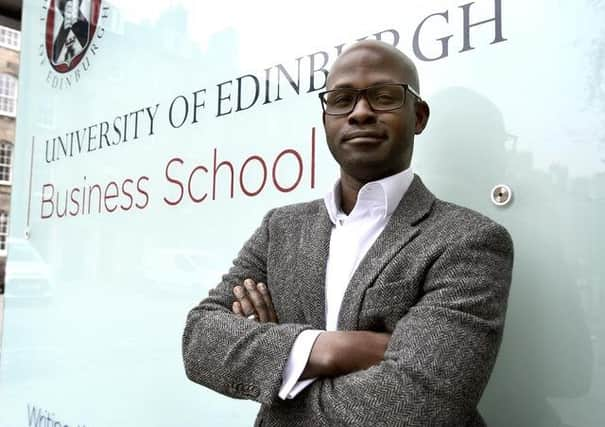Explore the consequences of climate change on finance


The University of Edinburgh has developed a 10-week course for professionals in financial services and fintech, or those seeking greater understanding of the impact of their investments – focussing on the consequences of climate change on finance.
The Climate Change Risk in Finance Course is a chance to learn how to navigate this fast-changing landscape and registration is now open. Spread over four modules, it will cover climate science; policy changes; accessing and interpreting data; and sustainable finance and fintech.
Developed from research and collaboration between different faculties at the University including the Edinburgh Futures Institute, the Centre for Business, Climate Change and Sustainability and the Edinburgh Climate Change Institute, the course will call upon the expertise across those disciplines and more to deliver this learning.


Dr Luca Taschini, a climate-change expert, heads up the course. He is a Reader in Carbon Finance at the University of Edinburgh Business School and he is involved in the Centre for Business, Climate Change and Sustainability.
Dr Taschini says knowing where to find the right data and how to interpret it is key to understanding how to measure risk and make accurate and informed decisions.
“The data aspect is front and centre,” he says. “It’s still very patchy for some reason, so you need different techniques and methods to be able to interpret that data and to understand its limitations.”
Sustainable finance will explore the route for investors and where their money is going, and how fintech companies and new apps are helping breach the gaps in this information.
Luca explains further: “I would be able to see much more what the constituents are of, for example, my pension contributions: are they adding to the problem of climate change or providing solutions?”
Professor Gbenga Ibikunle, or GB as he is known, Director for Industry, Economy and Society at Edinburgh Futures Institute, has been instrumental in developing the course and will lead one of the sessions. As a researcher in this field he has a wealth of knowledge about how climate change is affecting society and economies and how professions and practices are responding.
“Sustainable finance and climate change economics research are areas we [at the Edinburgh Futures Institute] are investing in, looking at them through various lenses. The Institute was established by the University to address intractable problems that face society – in terms of financial investment in the response to climate change, these problems are multi-faceted and we are going to address these issues in this course.”
He says climate change risk is something people need to understand, and what uncertainties it can engender.
“There is pressure on governments to act and acting means creating emission-constrained economies and moving from high to low carbon ones,” he says.
“However, it is not clear where climate change regulation is going, but businesses need to plan for the medium and long-term. This is where those in financial services can benefit from the training we are offering – getting an overview of what factors are creating the climate change risks they face, how to minimise those risks and how to future-proof investments.”
A growing number of investment managers and advisers are assessing exposure to climate change risks using Environmental, Social, and Corporate Governance (ESG) frameworks and emerging climate service providers and, Prof Ibikunle explains, the average person in society is becoming more concerned about these factors.
“An investor should want to know how exposed to ESG risk factors their portfolios are,” he explains. “You do not want to invest in a company that is using slave labour or is implicated in unethical behaviour because when these are brought to light and customers start voting with their feet, it will impact the bottom line and how the markets value those companies.”
Investments also need future-proofing, he explains. “The way businesses have operated for a long time is that as long as they are not breaking existing laws, that is enough, but that’s not the view a lot of investors are taking now, and it is certainly true in the case of young people. The cost of climate change is real, and most of the time it is affecting people in developing countries, those who are less able to bear its effects; hence, even if it is not captured at source, someone is always paying the cost of these emissions.”
No prior knowledge is needed to take the course. Each module, of three or four pre-recorded sessions, runs every second week. These sessions last about 30 minutes and for each module there is a one-hour Q and A live session, which will run over a lunchtime or early afternoon.
To register and find out more information on the course, which will begin on May 3, please visit www.business-school.ed.ac.uk/executive-education/climate-change-risk-in-finance
Eventbrite tickets for the course can be found at www.eventbrite.co.uk/e/climate-change-risk-in-finance-tickets-142660289767
Companies who wish to make group bookings should contact the University directly by emailing [email protected]
A limited number of discounted places are also available through the Scottish Funding Council (SFC) Upskilling Fund.
This course is offered by Edinburgh Futures Institute and the University of Edinburgh Business School
Edinburgh Futures Institute (EFI) is a strategic initiative of the University of Edinburgh, which aims to facilitate multidisciplinary learning and teaching at the University. With a particular focus on data driven innovation and future challenges, EFI is committed to collaborative research and engagement. Working with industry, governments and communities to build a challenge-led, data-rich portfolio of activity that has demonstrable social, economic and environmental impacts.